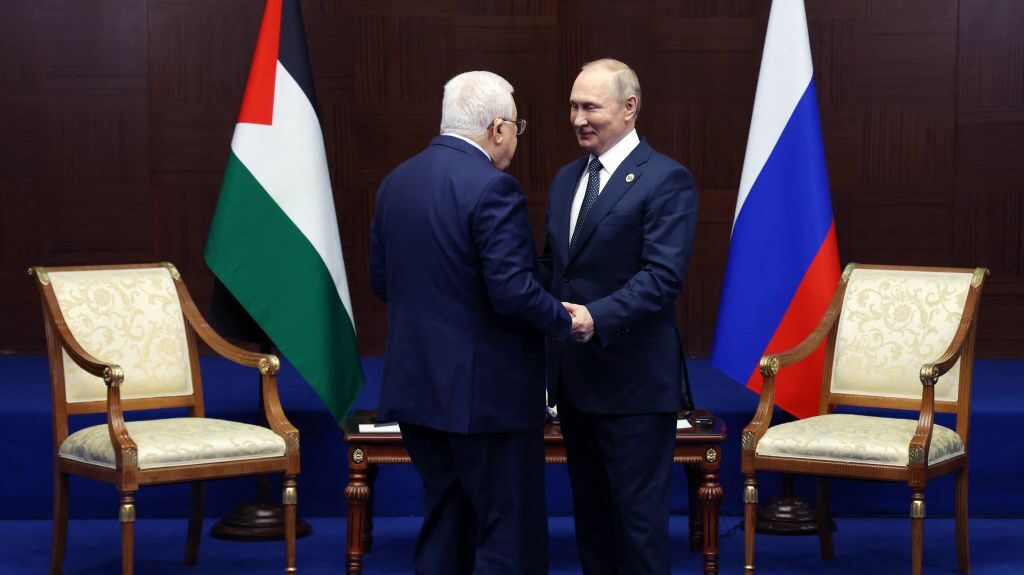Russia Using Israel-Hamas War To Push Anti-West Narrative, Analysts Say
Presenting itself as a defender of a Palestinian state, Russia is benefiting from what many in the Muslim world see as double standards by the US, which condemned Russia's invasion of Ukraine but supports Israeli strikes on Gaza
Russia is using the Israel-Hamas war to push its narrative against the West and is taking advantage of what many in the Muslim world see as double standards by the United States, analysts say.
Kerim Has, a Moscow-based political analyst focusing on Russia and Turkey, told The Media Line that the Kremlin is using the pro-Israel stance of most of the West to strengthen its relations with Muslim-majority countries.
Has said that Russia is presenting itself as a defender of a Palestinian state and condemning Israel’s strikes on the Gaza Strip, while at the same time trying to keep some distance from Hamas.
Russia is trying to take back the moral superiority that it lost during the invasion of Ukraine from the West
“Russia is trying to take back the moral superiority that it lost during the invasion of Ukraine from the West,” he said.
“I wouldn’t be surprised if Russia could [further] develop its relations with the Muslim world after this crisis.”
He said that China, which has not condemned Hamas, would likely also use the war to push its narrative.
In an article published at the end of October, China’s state-run Global Times said that the United States was not following its own expectations of others and that the war would undermine the US’s global power.
“Washington demands that other countries ‘act by international rules,’ but in the case of the Palestinian issue, Israel has not complied with UN resolutions,” the report said.
Give the gift of hope
We practice what we preach:
accurate, fearless journalism. But we can't do it alone.
- On the ground in Gaza, Syria, Israel, Egypt, Pakistan, and more
- Our program trained more than 100 journalists
- Calling out fake news and reporting real facts
- On the ground in Gaza, Syria, Israel, Egypt, Pakistan, and more
- Our program trained more than 100 journalists
- Calling out fake news and reporting real facts
Join us.
Support The Media Line. Save democracy.
“The US is still the most powerful country in the world, but if it can’t create more peace, the erosion of its leadership is inevitable.”
China stated that it voted against a draft resolution on Gaza by the US at the UN Security Council because of appeals from Arab countries—and that the draft did not support Palestinian statehood.
Some of the clearest divisions between the US and the Middle East came last month, when Washington vetoed the UN resolution that supported giving aid to Gaza and condemned violence against civilians.
The US stated that there needed to be more time for diplomacy to happen and complained that the resolution did not mention Israel’s right to self-defense, and said it was working with Israel and others to provide humanitarian support to Gaza.
In response, Russia’s ambassador to the United Nations, Vassily Nebenzia, accused the US of applying double standards and said it would be responsible for what happens to civilians “who are living under this deadly threat.”
A week later, Jordan, Oman, Saudi Arabia, Egypt, Bahrain, Qatar, Morocco, and the United Arab Emirates reportedly released a statement arguing that the right to self-defense did not justify violating international law in Gaza.
Hanna Notte, an expert on Russia and the director of the Eurasia Nonproliferation Program at the James Martin Center for Nonproliferation Studies, wrote in a New York Times op-ed that the war is helping Russia push its narratives against the West.
Notte stated that the Kremlin benefits from the war distracting attention away from Ukraine.
“Russia’s biggest gain may come in the court of global opinion,” Notte said. “Moscow’s messaging on the conflict—the Kremlin has refused to call the attack on Oct. 7 ‘terrorism’ and blamed the escalation on Western policy mistakes—aligns Russia with public sentiment across much of the Middle East.”
Sweden’s former prime minister, Carl Bildt, posted on X (formerly Twitter) that he feared many saw a double standard being applied by the US and the European Union in the Israel-Hamas war compared to the war in Ukraine.
The US has not just faced criticism from its enemies or on social media, but from its partners as well, with one of its key NATO allies, Turkey, blaming the West for much of the violence in Gaza.
“Those who have shed crocodile tears for the civilians killed in the Ukraine-Russia war before are silently watching the deaths of thousands of innocent children today,” Turkish President Recep Tayyip Erdoğan told a crowd in Istanbul last week during a pro-Palestinian rally.
“The West is mainly the one to be blamed for the massacre in Gaza. The massacre in Gaza is entirely because of the West,” Erdoğan said.
Atilla Yeşilada, an Istanbul-based analyst, said that while it might be easier for Erdoğan to deal with Russia and China, he did not expect the Turkish president to drift too far away from the US and the West.
Yeşilada said that Erdoğan understands that Turkey must improve its relations with the West to boost trade and help his country’s economy, which has been struggling for years with massive inflation and the devaluation of the currency.
“He needs to sustain some kind of growth and economic development and that just doesn’t happen with Russia or China,” Yeşilada said.
He added that both Russia and the US would want support from Turkey but it would play a balancing act.
“There is not enough pressure from either Russia or the United States for Turkey to pick sides. That’s the story for 2024,” he said.



